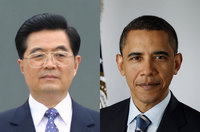At the London G-20 Summit in April, British prime minister and host Gordon Brown asserted that "The Washington Consensus is over." With the struggling U.S. economy pulling much of the world down with it, the "Anglo-Saxon model" is now deemed flawed. Dirigiste tendencies are in, with U.S. President Barack Obama embracing a government-funded "stimulus" package whose numbers are well in excess of his high-spending predecessor.
Washington itself is moving away from the formula -- consisting of fiscal discipline, market-set interest rates, competitive exchange rates, liberalisation of trade and investment regimes, deregulation and privatisation -- to which it lent its name. The "Washington Consensus" was a term coined by economist John Williamson back in 1989 to name a would-be policy panacea for struggling Latin American economies. When implemented via international financial institutions, the "one size fits all" approach did not always work, with the Asian economic crisis in 1998-99 being the classic case in point. Moreover, given that it was not adhered to by the U.S., even under allegedly free-market-oriented Republican administrations, it is debatable whether it was ever really a consensus to begin with. Certainly IFI aid recipients often had no choice but to apply the measures prescribed.
Still, whether Brown's baroque-sounding declaration is in fact true remains unclear. Such "line in the sand" soundbites might be more the product of Western navel-gazing than a reflection of real changes in underlying policy -- or even thinking -- elsewhere. China and India, who have cherry-picked their market reforms, are doing better in the global downturn than either their OECD counterparts or neighbouring states. Although neither country fully subscribed to every aspect of the Washington Consensus, neither one -- so far -- is seriously questioning those market-oriented principles and practices that they did use to underwrite their recent economic success. Unlike in Europe or the U.S., for example, neither Asian giant is contemplating the nationalisation of banks.

